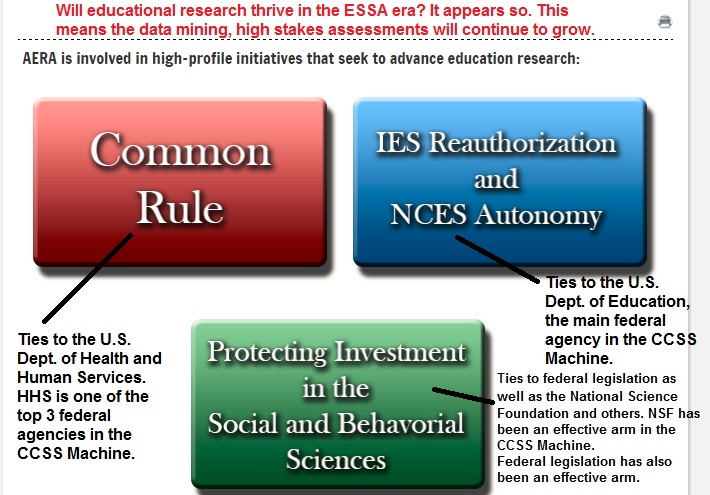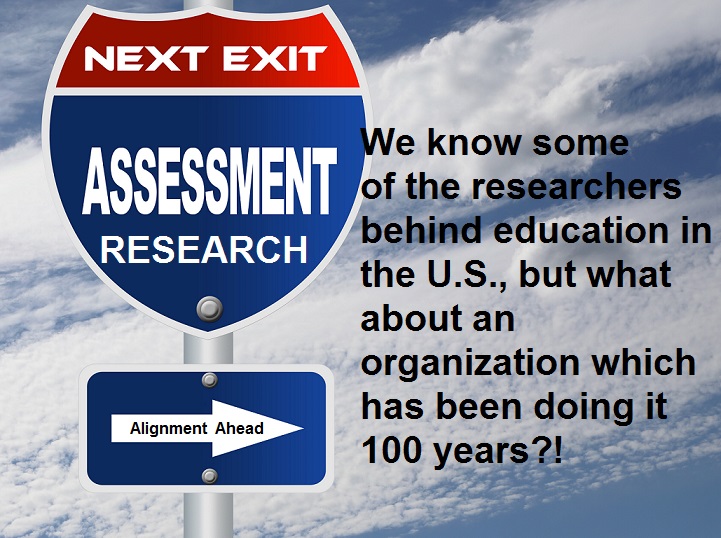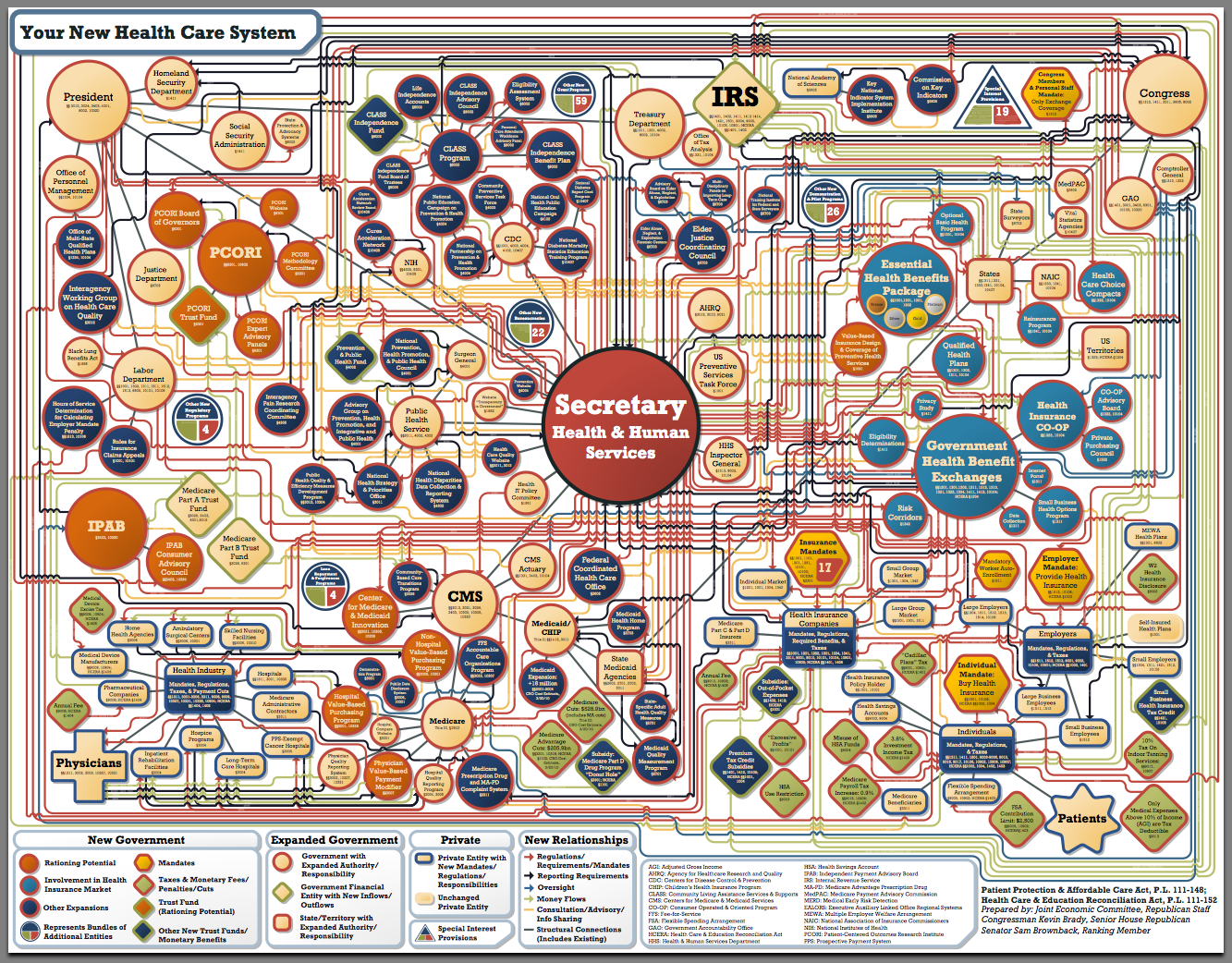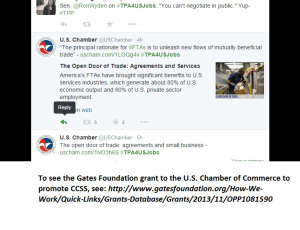Warriors Against the Core, with school back in session (or just about to be back in session), we know assessments are on everyone’s minds.
Tests, assessments, check-ups, quizzes, and whatever else these measurement tools are being called have been the bane of our educational system since Outcome Based Education via the Common Core State Standards rolled out.
We’ve read countless headlines, participated in numerous opt-out movements, held our children as they cried about these ‘wicked weapons’ used against them, and cursed the CCSS Machine for being so cruel.
So, what more could I possible share with you that might help our efforts to END the mindful abuse?
In digging through some ESSA (Every Student Succeeds Act) resources, I found an organization which has been researching not only assessments, but education in America for the past 100 years. That’s right, since 1916, our education has been studied by an organization not too far removed from the federal government.
**What follows is an in-depth look at one mammoth organization.
Enter, American Educational Research Association (AERA):
Website: http://www.aera.net/
From their “About Us” page, this excerpt, “founded in 1916, is concerned with improving the educational process by encouraging scholarly inquiry related to education and evaluation and by promoting the dissemination and practical application of research results.”
Look at bit further into who is involved with AERA and you will find a mixed bag of public-private groups, testing companies, non-profits, federal and state agencies, as well as international organizations. (see the rest: http://www.aera.net/About-AERA/Who-We-Are) (If you would like to see some of the AERA members and their accomplishments, see:
http://www.aera.net/Membership-Achievements) *Note, you need to not only look at the names but what these folks are doing in education. For example, Linda Darling-Hammond was among 3 educational women to be named as one of the 2015 “18 Women Everyone Should Know in K-12 Education”.
As far as the leadership behind AERA? Currently, the ties extend to the NSF (National Science Foundation, a huge CCSS/STEM supporter); The American Bar Foundation (yes, I have found CCSS ties to the American Bar Association); the University of PA; and the University of Michigan. In the recent past, the leadership has been from the Ford Foundation ( a huge CCSS, CTE, STEM financer). Even further back in the leadership, you will find Linda Darling-Hammond (1995-96), Harvard University ties (2000-2001), and a host of other universities we now know which have been a part of the CCSS Machine. Oh, and AERA has lots of SIGs (Special Interest Groups).
The programs AERA has? Those include educational research communications, advocacy, making sure any government legislation impacting education has their input (especially to preserve the scientific parts), professional development for educators, AND social justice issues. See: http://www.aera.net/About-AERA/Key-Programs
As far as AERA and the future of educational research? Here is an excerpt I found on their 2017 Annual Conference theme page, “As we begin AERA’s second century, the theme of the 2017 Annual Meeting is a call to examine these critical dimensions of educational opportunity and rigor in research as they pertain to the diversity of issues, populations, and contexts served in and by educational inquiry. These range from young children to their parents and families, from PreK-12 to postsecondary education and adult learning, from affluent districts to financially struggling schools, and from immigrant to low-income communities within urban and rural settings alike. They are studied in large datasets and in field studies, and through multiple methods, including qualitative approaches, experimental designs, and discourse analyses. They are investigated in both vastly different and complementary theories of learning, human development, literacy, sociolinguistics, and culture, and within different contexts. They are connected to race, language, and gender, and are embedded in systemic inequalities. Finally, they exist alongside enormous technological innovation, new approaches to studying diverse and historically underserved populations, refinement of existing methodologies, recurrent policy revisions, and the wide reach of global exchanges.” To see the rest (and you really should):
http://www.aera.net/Events-Meetings/Annual-Meeting
Bring on the Assessments Research!
Among the SIGs (Special Interest Groups), you will find the following organizations:
a) SIG #18, Classroom Assessments, their website: http://www.aera.net/SIG018/Classroom-Assessment-SIG-18 (Key contact, University at Albany – SUNY)
b) SIG #167, Cognition and Assessment, their website:
http://www.aera.net/SIG167/Cognition-and-Assessment-SIG-167 (Key contact, University of Georgia)
c) SIG #22, Computer and Internet Applications in Education, their website:
http://www.aera.net/SIG022/-Computer-and-Internet-Applications-in-Educ-SIG-22
(Key contact, the University of South Florida)
d) SIG #179, Data-Driven Decision Making in Education, their website:
http://www.aera.net/SIG179/Data-Driven-Decision-Making-in-Education-SIG-179
(Key contact, WestEd)
e) SIG #56, The John Dewey Project, their website:
http://www.aera.net/SIG056/Dewey-Studies-SIG-56
f) SIG #96, Inclusion & Accommodation in Educational Assessment, their website:
http://www.aera.net/SIG096/IAEA-SIG-96
(Key contact, Anne Davidson)
g) SIG #141, Large Scale Assessment, no website or contact information. The purpose, however, ‘To provide a forum for discussion of the status, issues, and concerns related to large-scale assessment, including practices and innovations in state assessment programs.’
h) SIG #63, Longitudinal Studies, their website:
http://www.aera.net/SIG063/Longitudinal-Studies-SIG-63
(Key Contact, CA State University, Los Angeles at Long Beach)
i) SIG #64, Measurement and Assessment in Higher Education, their website:
http://www.aera.net/SIG064/Measurement-and-Assessment-in-Higher-Education-SIG-64
(Key contact, University of IL at Urbana-Champaign)
j) SIG #99, NAEP Studies, no website information. Key contact, the California Dept. of Education. However, the purpose is as follows, “To facilitate secondary analysis of the National Assessment of Educational Progress ongoing surveys regarding U.S. students knowledge, attitudes and experiences in diverse learning areas.”
k) SIG #83, Rasch Measurement, their website: http://www.raschsig.org/
(Key contact, University of Memphis)
l) SIG #90, Research on Evaluation, their website: http://www.aera.net/SIG090/Research-on-Evaluation-SIG-90
(Key contact, University of TX at El Paso)
m) SIG #151, Technology as an Agent of Change in Teaching and Learning, their website:
http://www.aera.net/SIG151/SIG-By-Laws *Note: be sure to click on the “By-Laws” to see exactly what purpose this SIG is seeking to accomplish.
(Key contact, George Mason University)
n) SIG #72, Test Validity Research and Evaluation, their website:
http://www.aera.net/SIG072/Test-Validity-Research-and-Evaluation-SIG-72
(Key contact, University of Nebraska at Lincoln)
Warriors, I urge you to investigate AERA’s SIG list on your own. Why? Social emotional learning research, whole school reform research, workforce learning research, special needs education research, and so much more! See: http://www.aera.net/About-AERA/Member-Constituents/SIGs/SIG-Directory/First/A/Last/Z
So Are There CCSS Machine/ESSA Ties to AERA?
Absolutely! From an undated AERA Press Release, this excerpt, “Among the AERA members who contributed their research perspectives and expertise were Bridget Hamre, University of Virginia; Steve Hurlburt, American Institutes for Research; Steven Tozer, University of Illinois at Chicago; Mark Schneider, American Institutes for Research; Shaun Harper, University of Pennsylvania; Robert Balfanz, Johns Hopkins University; Gary Miron, Western Michigan University; Laura Perna, University of Pennsylvania; Michael Olivas, University of Houston Law Center; Yasmin Kafai, University of Pennsylvania Graduate School of Education; Richard Ingersoll, University of Pennsylvania; Deborah Loewenberg Ball, University of Michigan; Anthony Bryk, Carnegie Foundation for the Advancement of Teaching; and Bryan Hassel, Public Impact.”
What about all those universities? Aren’t they part of the CCSS Machine? Warriors, from my research I have been able to connect several colleges and universities across America as part of the CCSS Machine in one way or another.
I invite you to contribute any anti CCSS Warrior knowledge about ANY of the colleges/universities in this article. A simple way to see if an educational institution you suspect as tied to the CCSS Machine, is to get to their main website page (or, in the case of it being a university, go to their college of education’s main page). Type in ‘Common Core’ (or any of the code phrases you know are connected).
For example, my favorite college football team is from the University of GA (you saw them above in the SIG projects). In less than 1 minutes, I found almost 2,000 resources on GA’s main search page.
These public universities are perfect hiding places for the CCSS Machine to ‘improve’ the CCSS into the now famous CCR (College and Career Readiness); the “Next Generation”; the STEM to STEAM; the CTE (Career Tech Education), and on and on. Many privately funded educational post-secondary institutions are also in this mix. No educational offering should be considered safe anymore.
Remember, the public-private partnerships and their money grease the cogs in the CCSS Machine. It is our job to find as many wrenches to throw into those cogs!
To see what OTHER CCSS Machine member groups AERA works with, belongs to, contributes among: http://www.aera.net/Research-Policy-Advocacy/Coalition-Partners
To see AERA’s Position Paper on High Stakes Assessments: http://www.aera.net/About-AERA/AERA-Rules-Policies/Association-Policies/Position-Statement-on-High-Stakes-Testing
*Note, their position is based on a 2000 publication.
To see how AERA is supportive of the ESSA, AERA ESEA Rulemaking Comments
*Note: Much of AERA’s comments circle around the States and Title One. In the ESSA language, Title One is definitely tied to the assessments and these assessments are mandates from the Federal government.
Mentioned in the AERA comments is the “Common Rule”, to see what AERA is doing for the “Common Rule” for researching education (as well as their other research pet projects in the ESSA era), http://www.aera.net/Research-Policy-Advocacy/Issues-and-Initiatives

If you would like to see a recent AERA Research Report on how ‘great’ measuring non academic skills is and should be, see: http://www.aera.net/Newsroom/Recent-AERA-Research/Measurement-Matters-Assessing-Personal-Qualities-Other-Than-Cognitive-Ability-for-Educational-Purposes *Note: be sure to delve into their OTHER recent research, you’ll need to see the alignment to the CCSS Machine.
Our last tie to the CCSS Machine? You had to know this Foundation would show up at some point:
The Gates Foundation, 2013, granted AERA $250,000.00. See the purpose of the grant: http://www.gatesfoundation.org/How-We-Work/Quick-Links/Grants-Database/Grants/2013/05/OPP1091034
Closing:
Anti CCSS/ESSA Warriors, there is plenty here to use as weapons of truth in our local fights. Use only what you need, share the other portions. It may seem a bit overwhelming, but when you divide a mammoth organization’s CCSS Machine ties among several like-minded Warriors, it makes light work.
We MUST use this information! Assessments, data mining, and using our educators and students as guinea pigs for research is unacceptable.




3 thoughts on “Hiding Behind the Tests”